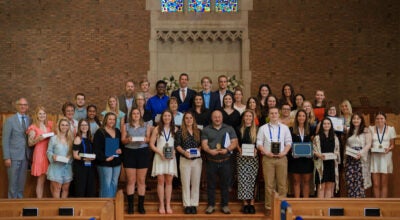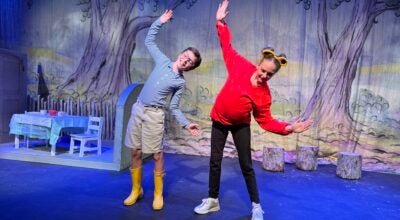Published 12:00 am Thursday, October 10, 2013
KANNAPOLIS — Sometimes, to help build a stronger future, you have to learn a lesson from the past.
That’s why, on Oct. 2, students at Kannapolis Intermediate School filed out of classes and lined the grassy hill by the ball fields to take a trip back in time.
Riding out into the field in the bright sun were four knights on horseback, parading in full armor with swords and lances — ready for battle.
But what these knights are fighting are problems that fifth- and sixth-graders face in daily life.
This is EarlyAct First- Knight, a character education program that’s sponsored by the Kannapolis Rotary Club and which teaches values of service, honesty, responsibility and friendship.
Every week, students will get lessons in character education, using the ideas of chivalry and service to help illustrate what they learn.
For instance, students have a guide in the Four-Way Test, designed to aid students in making the right decisions:
Of the things we think, say, and do,
Is it the truth?
Is it fair to all concerned?
Will it build goodwill and better friendships?
Will it be beneficial to all concerned?
When it comes to character-building, Principal Todd Parker said, “I think you have to start early to give (children) an idea of where they are going.”
In an age of increased concerns regarding bullying and peer pressure, character education is important.
“High school has service clubs,” Parker said, but there hasn’t been the same kind of emphasis on service-learning for younger children.
That’s the need that EarlyAct FirstKnight tries to fill.
“It’s putting these character education values into perspective,” said Meredith Spry, instructional coach at Kannapolis Intermediate School.
David Mesimer, who lives in Kannapolis and owns David Mesimer Stables, is the eastern U.S. program director for EarlyAct FirstKnight.
Mesimer, also a member of the Kannapolis Rotary Club, said he’s worked for almost two years to bring the program to Kannapolis City Schools.
“I’ve always been interested in medieval times and jousting,” Mesimer said.
He learned about the program, researched it and decided to get involved in bringing the program to schools.
Mesimer’s father, Larry, has worked in the local school system, “and I wanted to find a way to make a difference,” he said.
There’s more to the program than just pageantry, Mesimer said.
Different aspects of good character, represented such as “service,” “justice,” “largesse” and more, will be taught in 10-minute lessons throughout the school year.
The lessons are age-appropriate, he said, and allow teachers to lead discussions on what it means to make the right choices in one’s life.
Also, Kannapolis Intermediate School will soon charter its own service club, with students elected to represent their classes.
After studying these positive character traits, they’ll have an opportunity to perform service projects and act on them.
“Twice a semester, we’ll have awards ceremonies,” Mesimer said, at which students who’ve exemplified these values will be able to earn medallions and accolades as “squires” and “knights.”
“It’s real rewarding,” Mesimer said. “You’re seeing the results of the program.”
What’s more, he said, he’s seen disciplinary referrals drop by as much as 50 percent at some schools.
“The kids are learning to respect each other, and just make better decisions,” Mesimer said. “If they answer ‘no’ to any of those four-way test questions, they know they’re about to make a bad decision.”
For students, the visible rewards are entertainment — visits by knights and ladies, and tournaments featuring armored knights on horseback.
Out on the field, three of the knights took part in a tournament, conducting various feats of skill on horseback: catching rings on a lance, chopping a head of cabbage and throwing spears at a target.
David Mesimer, as Sir David, was one. His daughter, Kayleigh Mesimer, also competed — ladies of valor are also knights in this program.
The third and final competitor was Sir Troy, described as “undefeated” and “ruthless.”
“I joust today not for honor, nor glory, but for gold!” said Sir Troy, his voice amplified over the field.
Jefferson Pike, master of ceremonies and the programs, said he first worked with Randall Parr, founder of EarlyAct FirstKnight, in the U.S. Navy.
A stunt performer, Pike is now a campus leader for the eastern branch of EarlyAct FirstKnight.
Since 2007, EarlyAct FirstKnight has been adopted by 10 schools in North Carolina and South Carolina, Mesimer said.
Nationwide, he said, over 70,000 students are taking part in the program.
Pike said that, in his work with schools, “we’ve seen the number of disciplinary referrals decrease. We’ve seen test scores increase and bullying decrease.”
“It’s our chance to make a difference and do something that’s meaningful,” Pike said.
The symbols of knighthood, and the positive images of chivalry — honor, courage, valor — are what the program celebrates.
As Pike told the students during that opening tournament, the “knights” of today often wear uniforms instead of armor.
“Police and firefighters, first responders who put their lives on the line,” Pike said, as young people looked on.
Along with them, he said, are teachers and parents — “people who put themselves last” in order to help give children an advantage.
As the opening tournament went on, Sir Troy showed that he would stop at nothing to achieve victory — even cheating by picking up extra rings during one phase of the competition.
The students got the message, taking up a chant of “Kick him out!” when the judges said they had not seen Sir Troy cheat.
They did not kick him out, but in the end, right prevailed and Sir Troy admitted defeat — and was honored for doing so.
As in medieval times, at the head of the competition was the sovereign, Queen Eleanor. She spelled out the true definition of knighthood.
“A knight is sworn to valor,” said the Queen, portrayed by Angela Harris. “His word speaks only truth, his shield defends the weak and his wrath undoes the wicked.”
In the months ahead, the task for students is to do their best to be “knights” in their classrooms – learning lessons about honesty and making the right decisions.
Caroline Fongemy, fifth grade teacher, said she expects the program to teach her students real-world lessons.
“I hope that it brings them the character that they need to lead successful lives, not just in school but in all they do,” Fongemy said.
“Chivalry isn’t dead anymore,” said Stacy Giaccone, smiling as students left their seats and lined up to shake hands and pose for photos with the knights.
Though they may get “covered up” in day-to-day life, “those values have never gone away.” Giaccone said.
Contact Hugh Fisher via the editor’s desk at 704-797-4244.



